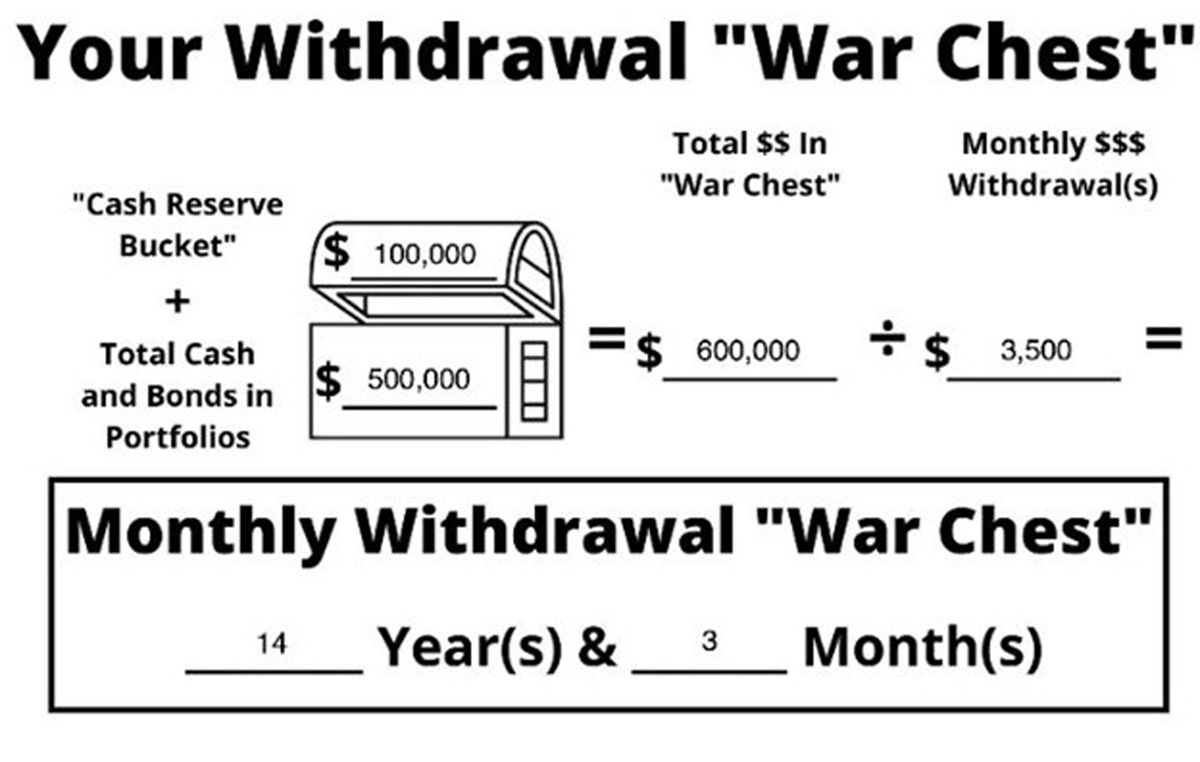Are You Going to Be OK in Retirement? 1 Easy Calculation Can Provide the Answer
Running out of money in retirement is a common fear, but knowing you have enough cash on hand to get through a severe stock market downturn can help. It’s a figure I call your “Withdrawal War Chest,” and it’s simple to calculate.


Profit and prosper with the best of Kiplinger's advice on investing, taxes, retirement, personal finance and much more. Delivered daily. Enter your email in the box and click Sign Me Up.
You are now subscribed
Your newsletter sign-up was successful
Want to add more newsletters?

Delivered daily
Kiplinger Today
Profit and prosper with the best of Kiplinger's advice on investing, taxes, retirement, personal finance and much more delivered daily. Smart money moves start here.

Sent five days a week
Kiplinger A Step Ahead
Get practical help to make better financial decisions in your everyday life, from spending to savings on top deals.

Delivered daily
Kiplinger Closing Bell
Get today's biggest financial and investing headlines delivered to your inbox every day the U.S. stock market is open.

Sent twice a week
Kiplinger Adviser Intel
Financial pros across the country share best practices and fresh tactics to preserve and grow your wealth.

Delivered weekly
Kiplinger Tax Tips
Trim your federal and state tax bills with practical tax-planning and tax-cutting strategies.

Sent twice a week
Kiplinger Retirement Tips
Your twice-a-week guide to planning and enjoying a financially secure and richly rewarding retirement

Sent bimonthly.
Kiplinger Adviser Angle
Insights for advisers, wealth managers and other financial professionals.

Sent twice a week
Kiplinger Investing Weekly
Your twice-a-week roundup of promising stocks, funds, companies and industries you should consider, ones you should avoid, and why.

Sent weekly for six weeks
Kiplinger Invest for Retirement
Your step-by-step six-part series on how to invest for retirement, from devising a successful strategy to exactly which investments to choose.
The stock market goes through recurring cycles that look to us like the four seasons. Fear is rarely apparent in spring or summer and barely palpable even in the fall. However, the “winter” portion of a stock market cycle is typically the harbinger of emotion-filled missteps by many investors.
“Am I going to be living under a bridge?” This is a “winter” question that I have often been asked over the past four decades, especially by prospective clients without a plan, even those with millions of investable dollars. This is because much of the “top of mind” space in our brain is allocated to thinking about our basic needs, including food, clothing, shelter, health care, transportation and education. When the stock market goes down, the reptilian, self-preservation portion of people’s brains often takes over, and they worry first and foremost about funding their basic needs.
The next and most important “winter” question I get asked is, “Am I going to be OK?” This is often due to a misperception that “something seems to be different this time.” Different in a potentially very bad way, more unusual than anything we’ve ever seen, and as a result, I may not be able to live and enjoy anywhere near the quality of life I had planned throughout retirement.
From just $107.88 $24.99 for Kiplinger Personal Finance
Become a smarter, better informed investor. Subscribe from just $107.88 $24.99, plus get up to 4 Special Issues

Sign up for Kiplinger’s Free Newsletters
Profit and prosper with the best of expert advice on investing, taxes, retirement, personal finance and more - straight to your e-mail.
Profit and prosper with the best of expert advice - straight to your e-mail.
At our firm, we have created a tool to provide clients with peace of mind showing them approximately how long they will be “OK.” I call this the “Withdrawal War Chest.” A war chest has historically been defined as a fund accumulated to finance a war, and recently, has expanded its meaning to a fund earmarked for a specific, challenging purpose. There are few financial endeavors more challenging than planning for retirement. Luckily, knowing your Withdrawal War Chest makes such planning much less stressful.
So how do you figure out your Withdrawal War Chest? Here’s our simple process:
- Add your total cash reserves AND total cash and bonds in your portfolios to get your War Chest.
- Divide your total War Chest by your monthly retirement withdrawal.
- That’s it.
This calculation provides an estimated time frame in which your War Chest (cash and bonds) alone could support your cash flow needs without withdrawing or selling a single penny from equities (stocks). To show you what that calculation could look like, let’s look at a hypothetical couple — John and Jane — who have a nice cash cushion saved up.

While the War Chest calculation is a simple one, its impact is tremendous. Your monthly Withdrawal War Chest is not only protection, but most importantly, peace of mind. Take John and Jane from our example above. They have 14 years and 3 months’ worth of withdrawals that is completely independent of the stock market. They don’t have to worry about it bouncing up, down or sideways. It’s just a quick snapshot, but it’s one that offers people confidence, because if the stock market goes through an extended “winter,” people are sure they can withstand it by not being forced to sell low.
The majority of people who liquidate most or all of their stocks while going through stock market downturns don’t have a plan and give in to fear. These types of emotional decisions often result in financial losses that are never recovered. This is not something you want to say when reflecting back on your life savings. While there is no magic wand to wave to take the emotions out of a decision, having a plan in place and knowing your Withdrawal War Chest can make those winter periods much less stressful.
Our typical retirement monthly Withdrawal War Chest has 10+ years of withdrawals. That being said, each individual household and family has their own unique needs. However, if you have a plan and know your Withdrawal War Chest, you can take a lot of anxiety out of investing and planning throughout retirement.
This information is prepared by DiNuzzo Wealth Management, and all opinions are the judgment of author P.J. DiNuzzo, as of the date of publication and could be subject to change. This material is provided for educational purposes only and readers should not rely on the content as the only basis for investment or retirement decisions or advice. Always consult with your personal financial adviser and tax adviser before making any financial decisions.
Profit and prosper with the best of Kiplinger's advice on investing, taxes, retirement, personal finance and much more. Delivered daily. Enter your email in the box and click Sign Me Up.

P.J. DiNuzzo, CFA, PFS, AIF, MBA, MSTX, is the founder, president and chief investment officer for DiNuzzo Private Wealth Inc./DiNuzzo Wealth Management in Beaver, PA. The firm has been helping pre-retirees and retirees make smart money and best-life choices for 31 years. P.J. is also the author of the book "The Seven Keys to Investing Success."
-
 Dow Adds 1,206 Points to Top 50,000: Stock Market Today
Dow Adds 1,206 Points to Top 50,000: Stock Market TodayThe S&P 500 and Nasdaq also had strong finishes to a volatile week, with beaten-down tech stocks outperforming.
-
 Ask the Tax Editor: Federal Income Tax Deductions
Ask the Tax Editor: Federal Income Tax DeductionsAsk the Editor In this week's Ask the Editor Q&A, Joy Taylor answers questions on federal income tax deductions
-
 States With No-Fault Car Insurance Laws (and How No-Fault Car Insurance Works)
States With No-Fault Car Insurance Laws (and How No-Fault Car Insurance Works)A breakdown of the confusing rules around no-fault car insurance in every state where it exists.
-
 For the 2% Club, the Guardrails Approach and the 4% Rule Do Not Work: Here's What Works Instead
For the 2% Club, the Guardrails Approach and the 4% Rule Do Not Work: Here's What Works InsteadFor retirees with a pension, traditional withdrawal rules could be too restrictive. You need a tailored income plan that is much more flexible and realistic.
-
 Retiring Next Year? Now Is the Time to Start Designing What Your Retirement Will Look Like
Retiring Next Year? Now Is the Time to Start Designing What Your Retirement Will Look LikeThis is when you should be shifting your focus from growing your portfolio to designing an income and tax strategy that aligns your resources with your purpose.
-
 I'm a Financial Planner: This Layered Approach for Your Retirement Money Can Help Lower Your Stress
I'm a Financial Planner: This Layered Approach for Your Retirement Money Can Help Lower Your StressTo be confident about retirement, consider building a safety net by dividing assets into distinct layers and establishing a regular review process. Here's how.
-
 The 4 Estate Planning Documents Every High-Net-Worth Family Needs (Not Just a Will)
The 4 Estate Planning Documents Every High-Net-Worth Family Needs (Not Just a Will)The key to successful estate planning for HNW families isn't just drafting these four documents, but ensuring they're current and immediately accessible.
-
 Love and Legacy: What Couples Rarely Talk About (But Should)
Love and Legacy: What Couples Rarely Talk About (But Should)Couples who talk openly about finances, including estate planning, are more likely to head into retirement joyfully. How can you get the conversation going?
-
 How to Get the Fair Value for Your Shares When You Are in the Minority Vote on a Sale of Substantially All Corporate Assets
How to Get the Fair Value for Your Shares When You Are in the Minority Vote on a Sale of Substantially All Corporate AssetsWhen a sale of substantially all corporate assets is approved by majority vote, shareholders on the losing side of the vote should understand their rights.
-
 How to Add a Pet Trust to Your Estate Plan: Don't Leave Your Best Friend to Chance
How to Add a Pet Trust to Your Estate Plan: Don't Leave Your Best Friend to ChanceAdding a pet trust to your estate plan can ensure your pets are properly looked after when you're no longer able to care for them. This is how to go about it.
-
 Want to Avoid Leaving Chaos in Your Wake? Don't Leave Behind an Outdated Estate Plan
Want to Avoid Leaving Chaos in Your Wake? Don't Leave Behind an Outdated Estate PlanAn outdated or incomplete estate plan could cause confusion for those handling your affairs at a difficult time. This guide highlights what to update and when.